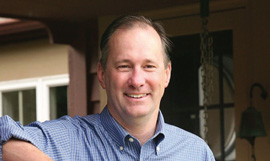I was reading a newspaper article not long ago about Donald Trump giving a speech at the Values Voter Summit where he announced he was going to put Christ back in Christmas, for which I’m sure Christ is grateful. Jesus had been trying to get back into Christmas, but had apparently met stiff resistance, so thankfully our President has done something about that and is making Jesus great again. He went on to say that people had forgotten about Jesus, so I went on Amazon and entered the word “Jesus” to see if that were true. Over a quarter million book titles popped up with the word “Jesus” in the title or subtitle, so I think President Trump might have been indulging in a bit of fake news, but who I am to say. Interestingly, one of the best-selling books about Jesus is a new book called The True Jesus, written by a man named David Limbaugh, the little brother of Rush, who I’m confident has extensive training as a theologian.
Despite Mr. Limbaugh’s conviction that he has discovered the true Jesus, there doesn’t seem to be a real consensus about Jesus. In Alabama, many Christians are convinced Jesus wants them to elect a pedophile to the Senate. I hope just as many Christians in Alabama are persuaded otherwise, and I hope they turn out to vote. The Senate has enough problems without adding a predator to its ranks.
Who do you say Jesus is?
When we talk about Jesus, we’re really talking about ourselves–our values, our priorities, our beliefs–and attaching Jesus’s name to them, which is how some Christians in Alabama can arrive at a radically different understanding of Jesus than ours. In this sense, Jesus is like a spiritual Rorschach test, our interpretation of his life reveals something about our lives, something about us and what we value.
And that’s okay, so long as realize that. For it’s only when we acknowledge the connection between Jesus and our ultimate values that we are able to realize our understanding of Jesus might be incomplete or inaccurate. Here’s an example of that. When I first became a Quaker, I was very enamored with Quakerism and believed that out of the tens of thousands Christian denominations, Jesus was just like the Quakers. What a wonderful coincidence, that Jesus and I embraced the exact same religion! But when I went to college and seminary and learned more about the historical Jesus, I had to let go of the idea that Jesus looked and thought just like me.
The problem in Alabama, and not just in Alabama, but among a lot of Americans today, is that too many people make no distinction between Jesus and their own cultural, religious, and political beliefs.
So when we ask, “How could anyone vote for a pedophile?”, we can only surmise those voters are able to dismiss and deny that reality, because Roy Moore looks, believes, and thinks much as they do. They are not just voting for him, they are voting for themselves, for their values and priorities. Indeed, they have deified their values and priorities, they have convinced themselves that their standards are God’s standards, which has caused them to lose all objectivity.
But this is not just an Alabama problem. It is a human problem. Thus, Jesus’s question to his disciples is for all of us—liberal, conservative, moderate, passionate, and indifferent. “Who do you say I am?” And if our answer to that question has Jesus looking and believing and acting just like us, we must entertain the notion that we might be mistaken, or at least blinded by our preferences.
This time of year, we are especially inclined to turn our minds toward Jesus. But let’s make sure the Jesus we turn toward isn’t just a caricature of ourselves, an extrapolation of our priorities. And that brings me to the heart of my message to you, friends. If I had my preference, I would want to live in a country which was so wisely and graciously governed, the church would never have to speak prophetically. I would want our leaders, Republican and Democrat alike, to know what is right, good, and noble and do it.
However, that is not the case today. So let me say something, and let me be as clear as I can be: Things are never so desperate in America that we must elect as our leaders those who prey on its most vulnerable citizens. Roy Moore and those like him are not so singularly gifted that we must overlook their corruption for some remote and imagined good only they can provide. They might have persuaded others they speak for Jesus, but it is a Jesus of their own making.
Jesus came to us an infant, vulnerable and powerless, at the mercy of those around him. We honor his life by nurturing and protecting the defenseless who depend upon us. Whatsoever we do to them, whatsoever we allow to be done to them, we do to Jesus.

